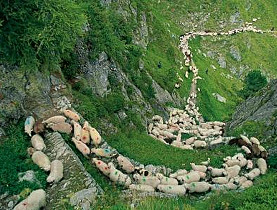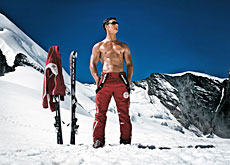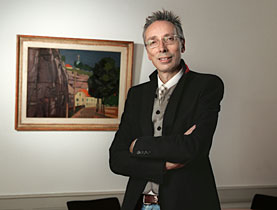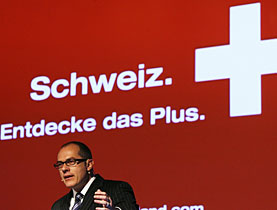Tourist industry must think “out of the box”

The Swiss tourism sector has enjoyed its best year since the early 1990s but structural deficiencies and complacency are keeping it from reaching its full potential.
The best way to meet the challenges and improve efficiency is to think “out of the box”, the annual gathering of tourism officials from across the country heard on Tuesday.
“If there are no free rooms in one resort, you’ll never find out if there is a room available in the next,” Jürg Schmid, director of the national tourist office, Switzerland Tourism, told swissinfo.
He was addressing one of the problems caused by the lack of coordination among the country’s hundreds of tourist offices.
Schmid said new thinking was also required to find solutions to other crippling problems such as the acute lack of accommodation in alpine resorts during the height of the ski season.
Many destinations complain of not being able to meet demand when there is in reality a surplus of accommodation. However, many empty beds are in privately owned holiday chalets and apartments that are not let out when unoccupied.
Schmid’s comments were surprising considering the steady growth seen by the industry over the past few years, culminating in 36.4 million nights spent by tourists in Swiss hotels in 2007. That was a 4.4 per cent increase on the previous year and the best result since 1992.
And this year could break all records thanks to the additional half-a-million hotel nights that Euro 2008 – the European football championship co-hosted by Switzerland and Austria – is expected to generate.
Too few guests?
Economics Minister Doris Leuthard commented ironically in her address to the meeting regarding the holiday home issue, “we have either too many apartments or too few guests”.
Overcoming problems in tourism required courage and persistence and not just big ideas, Leuthard said.
Climate change was also high on the agenda of the meeting in the southern town of Lugano, and ideas in the form of an action plan were presented.
The plan calls for the industry to become pro-active in limiting carbon dioxide emissions, adapting to a warmer world with the inherent increase of natural disasters but also marketing Switzerland’s competitive advantages. These include high-altitude ski resorts and fresh mountain air.
Climate gain
Indeed, the document, largely authored by industry officials, states that most tourist regions in the country have more to gain than lose if they seize the challenge of climate change.
A keynote speaker, Professor Andrew Razeghi from Northwestern University in Chicago, agreed that Switzerland had a “great product” to sell. But he told swissinfo that the country lacked emotional appeal.
“The Swiss are admired for their timeliness and stereotypical attention to detail. People know that,” Razeghi said. “The challenge is [marketing] emotional appeal.
“If you look at a country like Italy for example, it’s the opposite story. People have emotional ties to it and that’s why they go in droves to Tuscany. And the expectation is that things aren’t going to go as planned. In Switzerland, you know things are going to work, but where’s the emotional appeal, and how do you tell that story?”
Sex appeal
The national tourist office showed that it has already been moving in this direction with a hugely successful advertising campaign that came to an end a few weeks ago.
The campaign depicted an attractive, topless male ski instructor. Those seeing the poster or watching the advert on television were encouraged to log on to the Switzerland Tourism website and vote for their favourite Swiss beau on skis.
The simple idea translated into international media coverage and millions of visits to the site. And nearly half a million people took the time to participate in the contest in hopes of winning a ski holiday.
Asked to think out of the box and come up with his own big idea, the tourist director of the resort of Interlaken, Stefan Otz, said he could imagine creating a “vodka cruise” on one of the resort’s lakes to attract more Russian tourists.
“Some say we need fewer but larger tourist offices with more financial clout but in my opinion size doesn’t matter,” he told swissinfo. “You can’t focus on restructuring while forgetting about the product.”
swissinfo, Dale Bechtel in Lugano
Dutch tourists led the growth in visitor numbers among markets important for the Swiss tourist industry last year. The Dutch spent nearly 9% more nights in Swiss hotels – or 948,000 in total – than they did in 2006.
The biggest group of foreign guests, Germans, also increased the time they spent in Switzerland by 5.6%, or more than 6 million nights.
Russia, India, Spain and China are seen as having the most potential for growth. Visitors from these countries are forecast to account for between 400,000 and 600,000 hotel nights a year by 2011.

In compliance with the JTI standards
More: SWI swissinfo.ch certified by the Journalism Trust Initiative




You can find an overview of ongoing debates with our journalists here. Please join us!
If you want to start a conversation about a topic raised in this article or want to report factual errors, email us at english@swissinfo.ch.